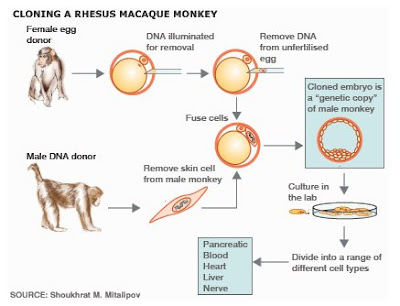
"A team in the US created dozens of cloned embryos from a 10-year-old male macaque, the journal Nature reports. This could make it easier to clone human embryos for use in research...
...Josephine Quintavalle, director of the campaign group Comment on Reproductive Ethics (Core) told BBC News: "Bringing a clone to term is the only way to show that the cloned tissue is safe."...
...“It’s clear that humans are very different from chimpanzees on several levels, but we wanted to find out if it could be the splicing process that accounts for some of these fundamental differences,” says Blencowe, a professor with the Banting and Best Department of Medical Research and Department of Molecular Genetics. “The surprising thing we found was that six to eight per cent of the alternative splicing events we looked at were showing differences, which is quite significant. And those genes that showed differences in splicing are associated with a range of important processes, including susceptibility to certain diseases".
...Josephine Quintavalle, director of the campaign group Comment on Reproductive Ethics (Core) told BBC News: "Bringing a clone to term is the only way to show that the cloned tissue is safe."...
...“It’s clear that humans are very different from chimpanzees on several levels, but we wanted to find out if it could be the splicing process that accounts for some of these fundamental differences,” says Blencowe, a professor with the Banting and Best Department of Medical Research and Department of Molecular Genetics. “The surprising thing we found was that six to eight per cent of the alternative splicing events we looked at were showing differences, which is quite significant. And those genes that showed differences in splicing are associated with a range of important processes, including susceptibility to certain diseases".
Noticing these differences between us and our Linnaean cousins has strong implications towards completing the database on why some diseases affect us and not others, and vise versa.
Now, ethically this seems wrong, yet, historically the treatment and advancement of medical science has always had a dark side. When the benefits come we rarely look at the process that brought them about. In the first stages though we want to fight tooth and nail against them and their barbaric methods. Reminds me of the saying "One cannot make an omelet without breaking a few eggs." Does it then comes down to the question of whether saving future lives are worth sacrificing some now.?
Always at odds, when weighing the factors of morality.


